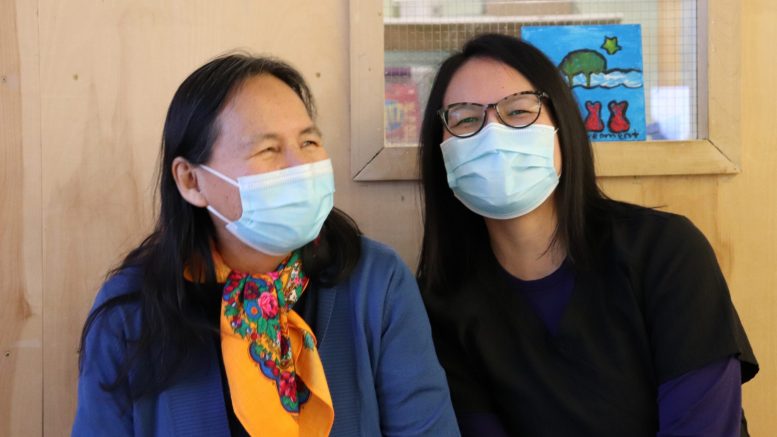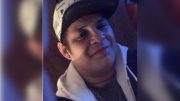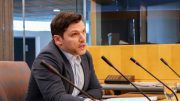“I want more,” joked Wekweètì Chief Charlie Football after receiving the COVID-19 vaccine.
Chief Football was the first in his community to receive the vaccination at the Wekweètì Youth Centre on Jan. 13.
On that day, a mobile vaccination team consisting of nurses, logisticians and a translator flew from Yellowknife with the vaccine to the small Tłı̨chǫ community.
The media were invited to tag along to report on the historic occasion.
Reassuring the community
A major challenge the mobile vaccination team faced was reassuring community members the vaccine is safe.
But the team had the perfect duo for this task — Lianne and Rosa Mantla.
Lianne is a nurse from Behchokǫ̀ who will be flying to numerous communities to administer the vaccine.
Rosa is an Elder from Behchokǫ̀, who overcame her dislike of flying to explain the vaccine to the community.
“So I can interpret for them to get the information out to them for better understanding,” she explains.
Rosa had just retired, but Lianne says she recognized her mother’s previous experience as an educator and Tłı̨chǫ culture and language coordinator made her an ideal person to help.
Rosa says after following the pandemic on the news she felt she needed to contribute.
So before embarking on the trip, Rosa spent time learning how the vaccine works and important words to translate — though some were harder than others. She laughed that there was no direct translation for “immunocompromised” and “DNA.”
The work paid off when the vaccine clinic opened around 10:30 a.m., Rosa immediately began speaking with Elders in the community.
Two Elders had questions on the vaccine for the Chief Public Health Officer Dr. Kami Kandola.
Rosa would translate their questions into English for Dr. Kandola and then give them her answers in Tłı̨chǫ. When the conversation finished, the Elders got their vaccination.
A part of history
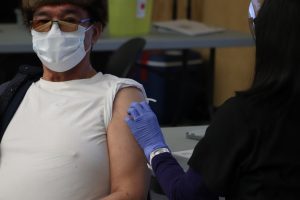
Wekweètì Chief Charlie Football was the first to receive the COVID-19 vaccine in the community. (Photo by Luke Carroll/ CKLB Radio.)
Lianne’s presence also helped reassure many community members.
“The layperson here, when she found out that I was coming, she was so happy and proud, because as a Tłı̨chǫ nurse, she wanted it today to be about showing you that trust was going to be a huge factor,” she explains.
Lianne says she hopes her role as a healthcare professional will allow her to continue to support to the communities.
“Being able to kind of help bridge the gap between the two cultures, I hope that will allow people to trust more in the system. And then also just to add a little bit of faith in what we’re trying to do with vaccinating,” she says.
Lianne is also the first registered nurse from Behchokǫ̀. Now she is part of a team trying to end the deadliest pandemic in over 100 years.
“I think being a Tłı̨chǫ citizen, Tłı̨chǫ born, Tłı̨chǫ speaking. It’s a part of history and I’m happy to be a part of it and happy to be doing it with my mom,” she says.
Rosa says her daughters profession makes her proud.
“Working in education, we’re really trying to promote young people to get into those fields, like medical fields,” she explains.
Scott Robertson, nurse and COVID operations executive co-lead, says in an email that Lianne and Rosa were incredibly important to the program.
He says his department is very grateful for their participation as Lianne “brings credibility and trust to the healthcare team that is incredibly valuable.”
Robertson adds that as a trusted Elder and educator, Rosa’s translation helped reassure many community members.
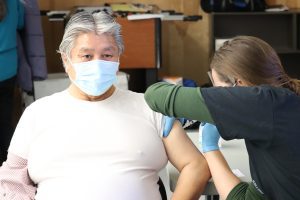
Joseph Judas, an Elder from Wekweètì, received the COVID-19 vaccine. (Photo by Luke Carroll/ CKLB Radio.)
Logistics
Before the flight took off, Sean Marshall, lead logistician for the Northwest Territories Health and Social Services Authority, explained how the territory was delivering the vaccines.
The GNWT secured five portable freezers which are retailed out of Nova Scotia.
The large freezers keep the vaccines at -22 C whereas most freezers only go to -18 C.
Two logisticians traveled with the team and monitored the freezer with vaccines the entire trip.
Dr. Kandola also traveled with the mobile team on Wednesday to receive her shot.
“This is a great step forward for the Northwest Territories to get the vaccine and not risk getting the disease,” she said moments after getting her shot.
She said this was done to instill confidence in the community.
“There were a number of chiefs that asked me to get the vaccine, because there was a lot of hesitancy in their communities,” she explained.
Dr. Kandola says the chiefs told her receiving the vaccine publicly would help instill confidence.
She added she hopes to receive her second dose in a different community if she is invited to do so.
‘I don’t want my family to see me dying of COVID-19’
The team administered 40 vaccinations to the community.
Joseph Judas, an Elder in the community, was an one of those recepients.
He said he’d been concerned about the risk of COVID-19 to his community for a while.
“We’ll have to really help one another, this sickness can’t be going to the communities,” he said.
Roy Judas also received a vaccine as his job requires him to travel.
Roy says the staff were very professional and took time to explain the vaccine, which he appreciated.
Chief Football was the first in his community to get a vaccine, he said he did this to try and encourage as many people as possible to follow in his footsteps.
“Get a needle,” he said. “If you get COVID-19 without getting the vaccine, it might be too late.”
Chief Football says he would much rather be out in the bush, but he was getting the vaccine for his family.
“I’m 70 years old,” he said. “I don’t want my family to see me dying of COVID-19.”
The mobile team will return to the Wekweètì in 28 days to administer a second doses and a first dose to anyone interested.
Luke Carroll is a journalist originally from Brockville, Ont. He has previously worked as a reporter and editor in Ottawa, Halifax and New Brunswick. Luke is a graduate of Carleton University's bachelor of journalism program. If you have a story idea, feel free to send him an email at luke.carroll@cklbradio.com

